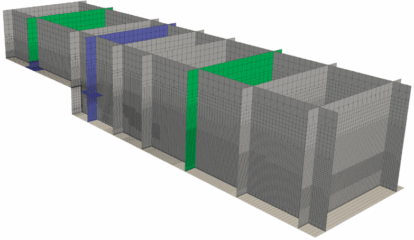Background: The proposed master thesis aims to advance a practical implementation of anisotropic grid-adaptation methodologies in widely used computational fluid dynamics (CFD) codes such as OpenFOAM and SIEMENS STAR-CCM+. Building upon the foundational work presented in [1,2], which introduces a directional error indicator for adaptive mesh refinement in large eddy simulation (LES), this thesis will focus on developing, validating, and robustly integrating these grid-adaptation strategies into established CFD platforms. The goal is to enable systematic, user-friendly, and efficient grid-adaptation workflows that can be readily adopted by both academic and industrial practitioners, thereby improving simulation accuracy and computational efficiency for complex turbulent flows.
[1] Toosi, S. and Larsson, J. (2017). “Anisotropic grid-adaptation in large eddy simulations”. Computers & Fluids, 156:146–161, 2017. https://doi.org/10.1016/j.compfluid.2017.07.006
[2] Toosi, S. (2019). “Error estimation, grid selection and convergence verification in large eddy simulation”. Doctoral dissertation, University of Maryland, College Park, USA. https://drum.lib.umd.edu/items/9ef37500-cbef-4746-abc2-708466393ae8
Specific tasks:
- Literature Review and Methodology Assessment: Conduct a comprehensive review of existing grid-adaptation techniques, with a focus on anisotropic refinement and error indicators in LES. Critically assess the implementation challenges and limitations in current open-source (OpenFOAM) and commercial (STAR-CCM+) CFD codes.
- Algorithm Development and Integration: Translate the anisotropic error indicator and adaptation logic from literature into robust algorithms suitable for integration with OpenFOAM and STAR-CCM+. Develop automated scripts or modules for post-processing LES results, computing directional error indicators, and generating refinement instructions compatible with each code’s mesh utilities.
- Validation and Benchmarking: Apply the developed methodology to canonical test cases (e.g., channel flow, backward-facing step) and compare results with established benchmarks and literature. Evaluate the robustness, efficiency, and user-friendliness of the implementation across different flow regimes and grid complexities.
- Extension and Industrial Relevance: Explore the extension of the methodology to unsteady and industrially relevant flows, considering practical constraints such as mesh quality, solver compatibility, and computational cost. Propose guidelines and best practices for practitioners aiming to adopt anisotropic grid-adaptation in their LES workflows.
Requirements:
- Solid background in fluid mechanics and turbulence modeling, particularly LES.
- Proficiency in using and modifying CFD codes, especially OpenFOAM or STAR-CCM+.
- Experience with mesh generation, adaptive mesh refinement, and post-processing of CFD data.
- Programming skills in C++, Python, or relevant scripting languages for automation and tool development.
- Analytical skills for interpreting simulation results and validating numerical methods.
Note: This work will be done in direct collaboration with and at an industrial partner.
Starting date: immediately
Supervisors:



